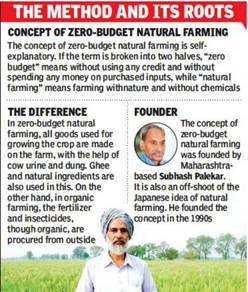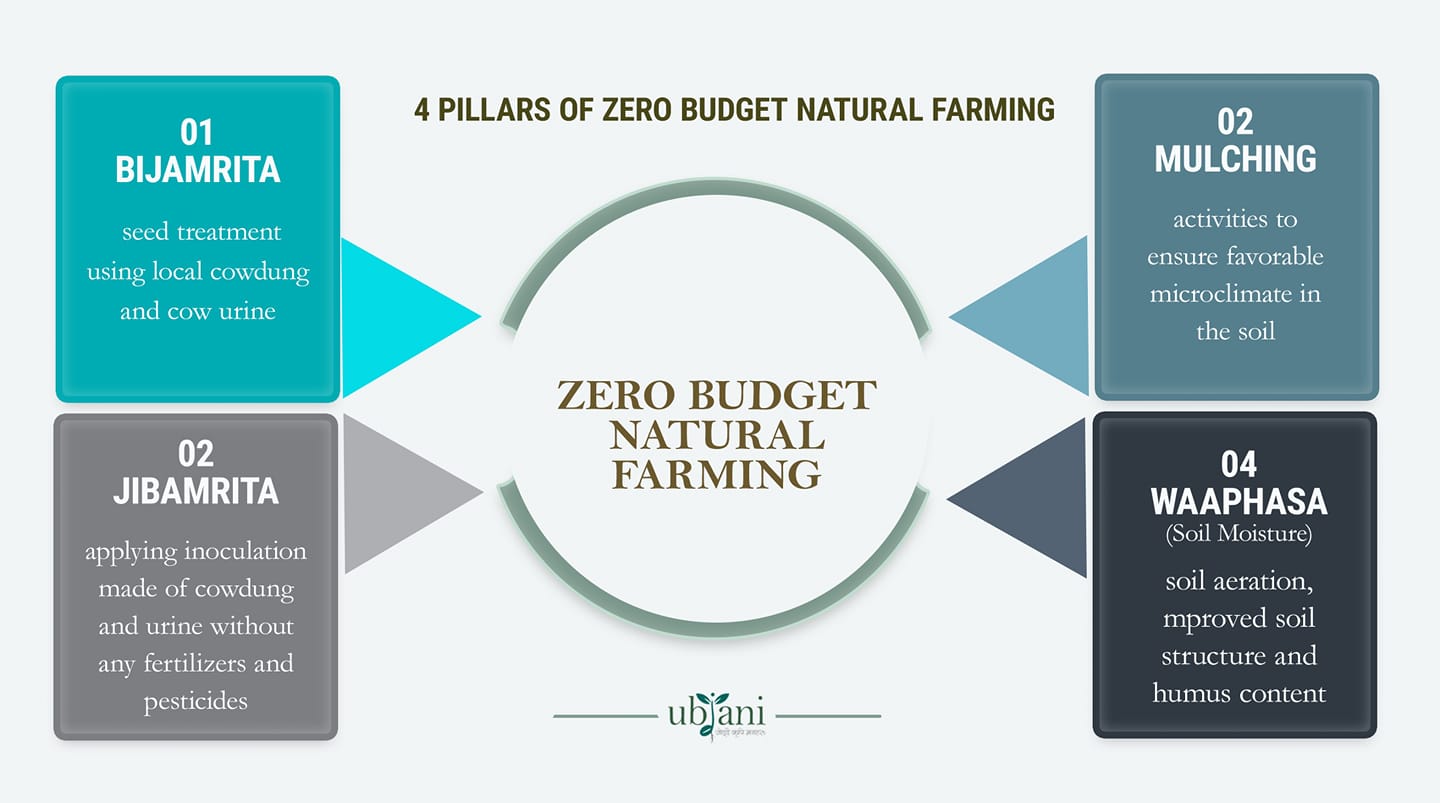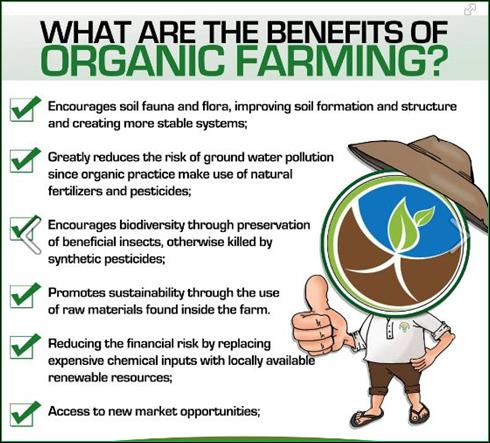Description

Disclaimer: Copyright infringement not intended.
Context
- Prime Minister Narendra Modi lauded the experiments of Natural Farming in Surat district of Gujarat.
What is natural farming?
- Natural Farming is a chemical-free alias traditional farming method. It is considered as agro-ecology based diversified farming system which integrates crops, trees and livestock with functional biodiversity.
- Natural farming as an ecological farming approach was established by Masanobu Fukuoka (1913–2008), a Japanese farmer and philosopher, introduced in his 1975 book The One-Straw Revolution.
- Natural farming is popularly known as “do nothing” farming and it is an environmentally sustainable way of growing food.
- The most critical aspect of natural farming is to let nature play a dominant role to the maximum extent possible. Hence, no-till, farm biodiversity, integration and symbiotic farm components and protection of soil cover all have a place in this process of farming.
Similarities between natural farming and organic farming:
- Natural and organic both are chemical free and more or less poison free farming methods.
- Both systems discourage farmers from using any chemical fertilizers, pesticides on plants and in all agricultural practices.
- Both farming methods encourage farmers to use local breeds of seeds, and native varieties of vegetables, grains, pulses and other crops.
- Organic and natural farming methods promote nonchemical and homemade pest control methods.
Key differences between natural farming and organic farming
- Fertilizers: In organic farming, organic fertilizers and manures like compost, vermin-compost, cow dung manure, etc. are used and added to farmlands from external sources. In natural farming, neither chemical nor organic fertilizers are added to the soil. In fact, no external fertilizers are added to soil or give to plants whatsoever.
- Organic matter: In natural farming, decomposition of organic matter by microbes and earthworms is encouraged right on the soil surface itself, which gradually adds nutrition in the soil, over the period.
- Agro practices: Organic farming still requires basic agro practices like plowing, tilting, mixing of manures, weeding, etc. to be performed. In natural farming there no plowing, no tilting of soil and no fertilizers, and no weeding is done just the way it would be in natural ecosystems.
- Cost: Organic farming is still expensive due to the requirement of bulk manures, and it has an ecological impact on surrounding environments; whereas, natural agriculture is an extremely low-cost farming method, completely molding with local biodiversity.
- Popular model: There are many working models of natural farming all over the world, the zero budget natural farming (ZBNF) is the most popular model in India. This comprehensive, natural, and spiritual farming system is developed by Padma Shri Subhash Palekar.
Principles of Natural Farming in a nutshell,
- No, till farming – plowing the soil alters the natural environment of the soil and promotes the development of weeds.
- No weeding by tillage or herbicides – weeds are not eliminated however, can be suppressed by spreading straw over freshly sown land and growing ground cover.
- No chemical fertilizers – this is because adding chemical fertilizers help in the development of the plant but not of the soil, which continues to deteriorate.
- No dependence on chemical pesticides – natures have balancing act prevents any one species from gaining the upper hand.
Forms of Natural Farming
Fertility farming
- In 1951, Newman Turner advocated the practice of "fertility farming", a system featuring the use of a cover crop, no tillage, no chemical fertilizers, no pesticides, no weeding and no composting.
- Although Turner was a commercial farmer and did not practice random seeding of seed balls, his "fertility farming" principles share similarities with Fukuoka's system of natural farming. Turner also advocate a "natural method" of animal husbandry.
Rishi Kheti
- In India, natural farming of Masanobu Fukuoka was called "Rishi Kheti" by practitioners like Partap Aggarwal.
- The Rishi Kheti use cow products like buttermilk, milk, curd and its waste urine for preparing growth promoters.
- The Rishi Kheti is considered to be non-violent farming without any usage of chemical fertilizer and pesticides.
- They obtain high quality natural or organic produce having medicinal values. Today still a small number of farmers in Madhya Pradesh, Punjab, Maharashtra and Andhra Pradesh, Tamil Nadu use this farming method in India.
Zero Budget Farming
- Zero Budget Farming is a variation on natural farming developed in, and primarily practiced in southern India. It also called spiritual farming.
- The method involves mulching, intercropping, and the use of several preparations which include cow dung. These preparations, generated on-site, are central to the practice, and said to promote microbe and earthworm activity in the soil. Indian agriculturist Subhash Palekar has researched and written extensively on this method.

About ZBNF

Why is ZBNF necessary?
- From the (NSSO) National Sample Survey Office data, 70% plus of farmers spend more they earn, and most farmers have debt.
- The indebtedness level is around 90% in states like Andhra Pradesh and Telangana, where each household has an average debt of Rs 1 lakh.
- To achieve the promise of the central government to double the income of farmers by 2022, one factor being considered is natural farming methods zero budget natural farming.
Why is ZBNF important in a nutshell
- Farmers depend on loans.
- The economic survey has highlighted the ecological benefits.
- Cost of farming inputs is rapidly increasing.
- The number of farmer’s suicide cases is growing continuously.
- The demand for safe food increased among customers.
- Unstable market price.
Advantages of Zero Budget Natural Farming
- Zero budget natural farming reduces the initial cost of farmers.
- Farmer’s income automatically increases.
- The soil ecosystem improves.
- Cow dung adds soil value. It is full of nutrients value and available locally.
- Bacteria of cow dung decompose the organic matter in soil and make soil for the plants.
- It requires less electricity and water.
- ZBNF improves the productivity of the soil.
- It decreases the disease attack risk on the crop.
Disadvantages of Zero Budget Natural Farming
- This farming method used in some parts of India.
- The type of farming being debated, and there is not much scientific research under evaluation.
- This farming technique used in negligible areas.

Promotion of Natural Farming in India
- In India, Natural farming is promoted as Bharatiya Prakritik Krishi Paddhati Programme (BPKP) under centrally sponsored scheme- Paramparagat Krishi Vikas Yojana (PKVY).
- BPKP is aimed at promoting traditional indigenous practices which reduces externally purchased inputs. It is largely based on on-farm biomass recycling with major stress on biomass mulching, use of on-farm cow dung-urine formulations; periodic soil aeration and exclusion of all synthetic chemical inputs.
- According to HLPE Report, natural farming will reduce dependency on purchased inputs and will help to ease smallholder farmers from credits burden.
- The BPKP programme has been adopted in State of Andhra Pradesh, Karnataka, Himachal Pradesh, Gujarat, Uttar Pradesh and Kerala.
- Several studies have reported the effectiveness of natural farming- BPKP in terms of increase in production, sustainability, saving of water use, improvement in soil health and farmland ecosystem. It is considered as a cost- effective farming practices with scope for raising employment and rural development.
https://www.thehindu.com/news/national/pm-modi-pitches-for-natural-farming-says-its-like-serving-mother-earth/article65623024.ece
1.png)
















